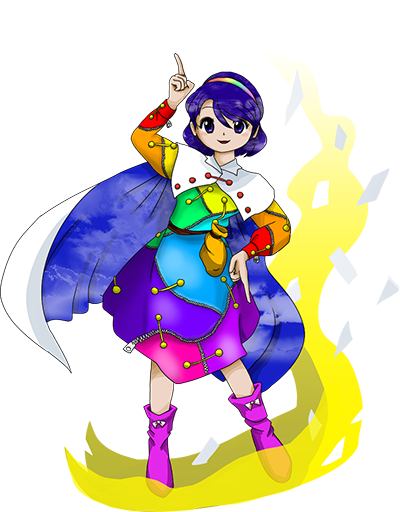Touhou 18 Is Not About Capitalism
A common misconception I see about Touhou 18 (Unconnected Marketeers, or UM for short) and the character of Chimata Tenkyuu in particular is that the game is about capitalism, or that Chimata herself is a capitalist. This is often done as a joke or meme, such as suggesting Chimata would sell NFTs, but I’ve seen it enough that I feel it needs to be corrected. I will also explain the mythical basis for the character Chimata. This post will probably be a lot of pedantic complaining about a subject nobody cares about, so let that be your warning.
I should also mention my conventions in this article. Any translations will be my own, although I will be using the Touhou Wiki for references and to source the original Japanese text. Single word romanizations and translations will be as follows: 日本 (nihon) “Japan.” My translations will be extremely literal, the reason being that I’ll get complaints if I don’t, because people don’t understand how translation works.

Chimata Tenkyuu from Touhou 18.
Chimata Tenkyuu (天弓 千亦 Tenkyuu Chimata) is the stage 6 boss of UM, and is a god(神様)which means she requires faith to survive. In particular, she is a “god of objects that lack owners”(無主物の神) which
may sound like an odd thing to be a god of. However, it is very important for understanding her ability and concept. ZUN describes his idea of a marketplace in
Chimata’s character profile (in the omake.txt text file included with the game):
人が唯一物を交換できる場所、それが市場だ。市場で売る事によって、完全に所有権を失うことが出来る。彼女はそれを司る神様である。
Translation: “The only place that people can exchange things is the marketplace. By selling at a marketplace, it is possible to completely lose ownership (of an object). She is a god who governs that (act).”
Because of how gods (Shinto kami in particular) work in Touhou, the act of losing ownership as part of an exchange at a marketplace is what gives Chimata faith. She is not one of the parties in the exchange, and so can’t gain a profit from it. She only cares about overseeing the exchange itself, as a source of faith which keeps her alive. It is heavily implied that Chimata can only oversee physical markets, as the following quote from her profile suggests:
最近は市場を介さないで物の売買を行う事が増え、結果所有権が氾濫している事を嘆いていた。
Translation: “Recently, acts of selling and purchase without a marketplace as the intermediary have increased, and as a result there is now an overabundance of ownership rights. Chimata had lamented this fact.”
What this means is that Chimata was at risk of disappearing, or losing her identity as a god, due to the reduction in faith going to her as COVID lockdowns prevented physical marketplaces such as Comiket from being held. The physicality of the marketplace is central. In the Shinto(神道)religious tradition, there are tutelary deitices known as Icho-no-kami(市の神)which protect trade and marketplaces. Chimata is clearly intended to be one of those deities, in particular, she seems to be a kami of event markets; users that bought UM at the doujin event Comic1 BS Festival Special in May 2021 were given a special card with Chimata on it, and a description that included the text
ネット通販が当たり前のこの時代、 直接売買する市場なんて、もう消えゆく存在なのか?
いや、人間がビットの集合体では無い限り、 市場の神の許可無き売買では決して満足できないだろう。
Translation: “In this generation where online shopping is commonplace, are marketplaces where one engages in direct buying and selling already on the way out? No, as long as humans are not an aggregate of bits, they will surely not be satisfied by trades done without the permission of the god of the marketplace.”
Finally, I should say something about the specific deity (or deities) that Chimata is based on. The Kojiki(古事記) and Nihon Shoki(日本書紀) are early chronicles of Japanese mythology and mythologized history. When the deity Izanagi performs the misogi ceremony in the narrative of the Kojiki, he gives birth to a god known as Chimata-no-kami(道俣神)or sometimes Michimata-no-kami. In the Nihon Shoki, this god is named Amagui-no-kami(開囓神)instead. The word 巷 (chimata) itself means “crossroads,” which is a common place to hold or build a marketplace in pre-industrial societies. Therefore, Chimata’s name originates from the ancient connection of crossroads with marketplaces.
The confusion between Chimata’s power over physical marketplaces and the idea of a marketplace in capitalism is more understandable if we look at the dialogue and spell card names in UM; Chimata has a spellcard with names like “Bullet Market” (a pun on bull market) and “Danmaku Free Market” which reference concepts that only exist under capitalism. Finally, Chimata says the following in most of her dialogue with the four playable characters:
神の手から逃れられる物か
Translation: “Nobody can escape from the hand of god.”
It’s possible this is referring to the “invisible hand of the market,” a concept invented by Adam Smith and commonly invoked as a justification for capitalism. Therefore, while the story of Touhou 18 and the character of Chimata herself are not about capitalism per se, there are references to it used throughout the game.